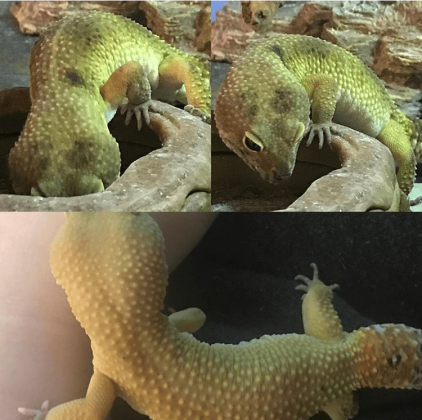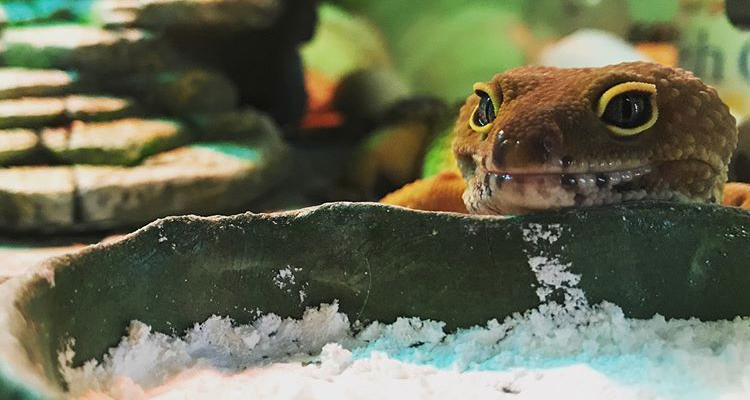Leopard Geckos are a great starter reptile, but unfortunately there is sometimes a misconception that they are extremely easy to look after, which isn’t the case and can lead to them being given the incorrect care.
They require a special setup, the correct diet and have different needs to mammals, and unfortunately there are lots of geckos who are kept in poor conditions, or even abandoned if the owner can’t take on the commitment of owning one.
Luckily there are many people who take on rescues, and look after them until they’re healthy again.
Today I am speaking to Jamie, who runs the Instagram account @AlexanderTheGeck about Alexander’s story and recovery.
Leopard Gecko Care: Hi, Jamie, thanks for agreeing to share Alexander’s story with us! To start with, could you give us a little background on how you found Alexander, what condition he was in, etc.?
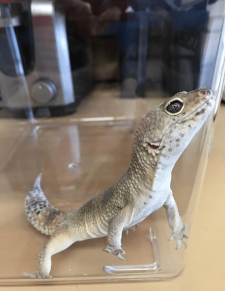
@AlexanderTheGeck: He was abandoned or escaped. When he was found he’d been living “wild” in the concrete backyards of Queens, NYC for what looked like quite a while, and was basking on the concrete.
The funny thing was, I was about to buy a leopard gecko from a breeder, and then suddenly there was a post on the r/leopardgeckos subreddit about a found gecko, literally a few blocks from my place.
I ordered all the supplies with priority shipping and picked him up like three days later – it happened so fast!
When I got him he was in pretty rough shape. Skinny but not super malnourished, with a lot of dirt and abrasions on his skin.
The guy that found him had managed to get the stuck shed off his feet, but he wasn’t easy to handle so he left him alone after that.
Leopard Gecko Care: And how was he once you got him home, and what care did you need to give him to get him back to a good health?
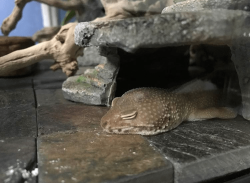
@AlexanderTheGeck: He was very hungry, and ate basically as soon as I offered food, even though he was cold and very skittish. Then as soon as he got on the heated tiles, he crashed.
It took 3 full sheds for all his scrapes and rough skin to heal. He got regular soaks and betadine on his right elbow which had lost a few scales and carried a scar for a while, but this eventually faded after a lot of sheds.
He gained a little weight, but then stopped at about 65g. He still looked thin, so I took him to the vet and he was FULL of pinworms, and needed two treatments to control them.
Leopard Gecko Care: Can you tell me a little more about his worm treatment? How long did it take to get rid of the worms, what was he given for them and did he need any special diet?
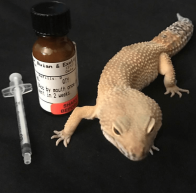
@AlexanderTheGeck: He got two treatments (8 doses) of Panacur, over the course of three months.
I had to wrap him up in an old shirt to stop him from squirming and then rubbed under his mouth to get him to open it.
He spat it out a few times before I had success actually getting it in there.
Also he couldn’t have crickets for the duration of the treatment but other than that he just ate the usual gecko food.
Leopard Gecko Care: That’s a great tip for getting a gecko to open it’s mouth. Can I also ask why no crickets for the duration of this treatment?
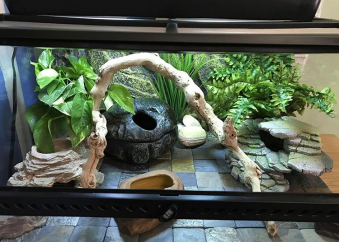
@AlexanderTheGeck: Crickets carry pinworms naturally, usually not enough to cause them to stay in the gecko’s gut, but they can make an existing infection worse.
Leopard Gecko Care: I didn’t know that about crickets and pinworms, but really useful to know! And how’s he doing now?
@AlexanderTheGeck: He’s almost 90g now, but still not always the most personable gecko. It took several months of re-taming for him to trust me.
Leopard Gecko Care: He looks in perfect condition now and he’s so lucky that you took him on, thank you so much for sharing your story with me!
Key points to take away:
- Betadine can be used to treat minor wounds on leopard geckos such as cuts, scrapes, burns. They can often heal on their own without treatment but if the wound persists, then this could be an option. However if you are unsure, please consult an exotic vet.
- If you suspect that your gecko has a parasite due to lack of appetite, weight loss, or no weight gain, it is best to consult a vet. They will be able to examine the gecko or may request a stool sample to run the necessary tests.
- Follow @AlexanderTheGeck on Instagram to see what he gets up to 🙂
Alexander then and now
